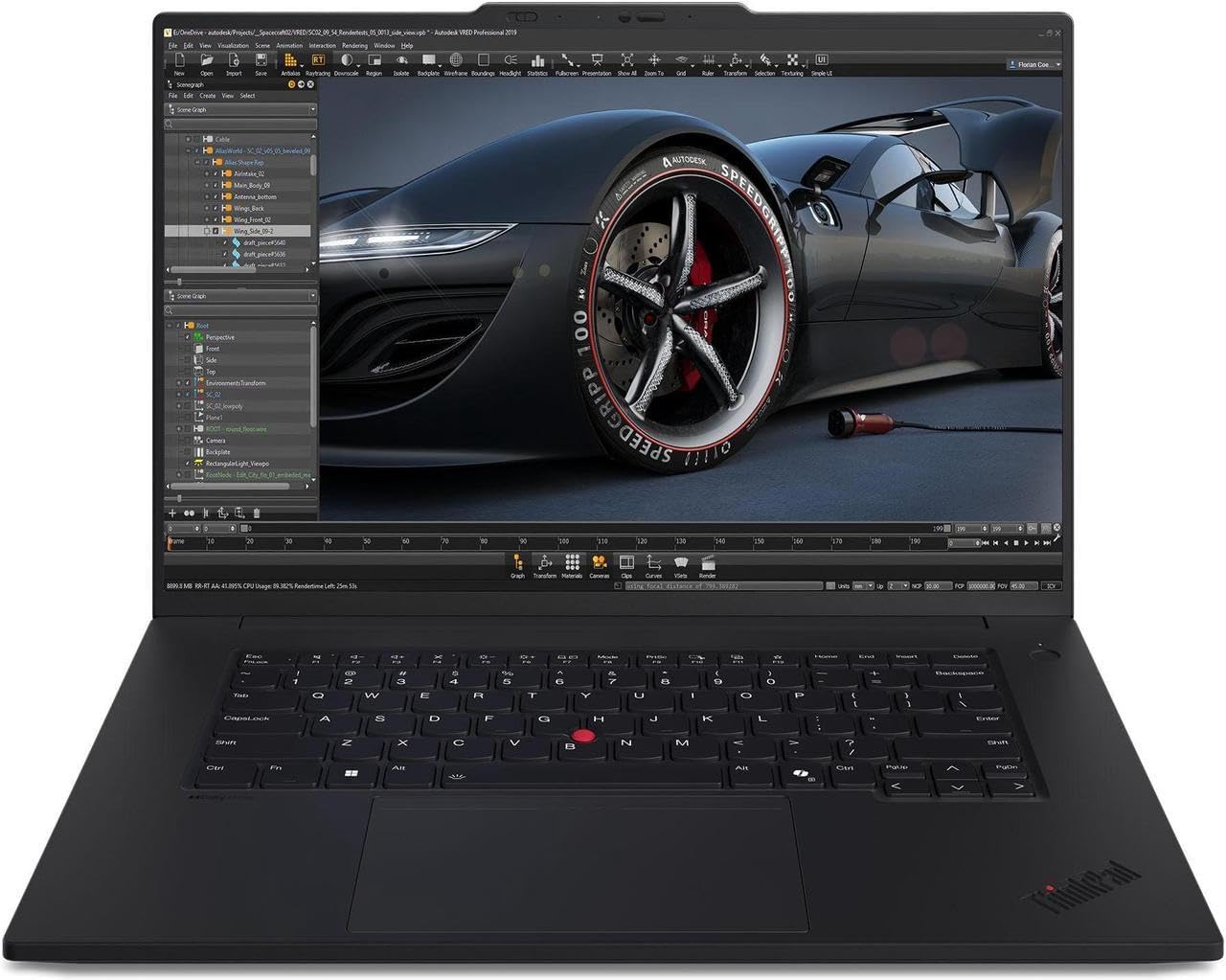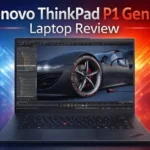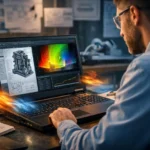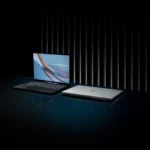Choosing the perfect laptop for BTech (Bachelor of Technology) students can be challenging. Engineering courses require powerful devices that handle heavy software like CAD, MATLAB, programming IDEs, and simulations smoothly. In this guide, we review the best laptops for BTech students in 2025, focusing on performance, portability, battery life, and price — helping you make an informed decision.
Why BTech Students Need Powerful Laptops
Engineering studies involve resource-intensive tasks such as 3D modeling, coding, circuit simulation, and data analysis. A laptop for BTech must support:
- Fast processing power for multitasking and demanding software
- Dedicated graphics for CAD and 3D rendering
- Ample RAM to run multiple applications simultaneously
- Large and fast SSD storage for quick file access
- High-quality displays to reduce eye strain during long study hours
- Good battery life for all-day use on campus
Top 6 Laptops for BTech Students in 2025
1. ASUS ProArt P16 — The All-Round Powerhouse
Powered by the latest AMD Ryzen 9 HX and NVIDIA RTX 4070, this laptop handles heavy CAD work and simulations effortlessly. It features a 16-inch 4K OLED touchscreen for crystal-clear visuals and offers up to 32GB RAM with blazing-fast SSD storage. Ideal for students who need power without sacrificing portability.
Pros:
- Superb performance for engineering apps
- Stunning 4K OLED display
- Good thermal management
Cons:
- Slightly heavier than ultrabooks
- Premium price tag
2. MSI Cyborg 15 — Best Value for Budget-Conscious Students
With an Intel Core i7-13620H processor and RTX 4050 GPU, the Cyborg 15 provides excellent graphics performance at a more affordable price. It comes with 16GB RAM and a 512GB SSD, perfect for CAD, programming, and multitasking without breaking the bank.
Pros:
- Affordable yet powerful
- High-refresh 144Hz display
- Solid build quality
Cons:
- Battery life could be better
- Slightly bulky
3. Lenovo ThinkPad X1 2-in-1 Gen 10 — For All-Day Battery Life and Versatility
This 2-in-1 convertible laptop offers up to 24 hours battery life and a bright 14-inch touchscreen. Its lightweight design and pen support make it perfect for note-taking, coding, and presentations.
Pros:
- Exceptional battery life
- Lightweight and portable
- Durable ThinkPad build
Cons:
- Less suited for heavy graphics work
- Premium price
4. Asus ROG Zephyrus G14 — Ultra-Portable Powerhouse
The Zephyrus G14 combines a compact 14-inch QHD display with powerful Ryzen CPUs and Nvidia GPUs. It weighs under 3.5 lbs, making it ideal for students who want a gaming laptop that doubles as an engineering workstation.
Pros:
- Excellent balance of portability and power
- High refresh rate display
- Great thermal design
Cons:
- Higher price point
- Limited port selection
5. Framework Laptop 13 — The Eco-Friendly, Upgradeable Choice
Known for its modular design, the Framework Laptop lets students easily upgrade or repair components. Featuring the latest AMD Ryzen or Intel chips and supporting up to 96GB RAM, this is perfect for tech-savvy students who want a future-proof machine.
Pros:
- Fully upgradeable and repairable
- Lightweight and compact
- Strong performance options
Cons:
- Requires DIY spirit for upgrades
- Not widely available in all regions
6. Apple MacBook Air 13 (M4, 2025) — Best for Lightweight Tasks and Battery Life
Apple’s new M4 chip brings a blend of power and efficiency. The MacBook Air 13 offers up to 18 hours battery life and a crisp Liquid Retina display, excellent for coding, document work, and light design applications.
Pros:
- Exceptional battery life
- Sleek and ultra-portable
- Robust software ecosystem
Cons:
- Limited to lighter engineering tasks
- Expensive for specs offered
How to Choose the Right Laptop for Your BTech Journey
Consider Your Major and Software Needs
- Mechanical and Civil engineering students often need high-end CPUs and GPUs for CAD and simulations.
- Computer engineering students can prioritize CPUs and RAM for programming and development environments.
Set a Realistic Budget
- Entry level: Around $800–$1200 for solid laptops like MSI Cyborg 15 or entry Framework models.
- Mid-range: $1200–$2000 for ASUS ProArt P16 or Asus ROG Zephyrus G14.
- Premium: $2000+ for Lenovo ThinkPad X1, Dell XPS 16, or MacBook Pro.
Balance Performance and Portability
Heavy-duty laptops often weigh more but provide better cooling and performance. Ultra-portables save your back but may compromise on high-end GPUs.
Prioritize Battery Life
Long battery life ensures you can study in libraries, labs, or outdoors without constantly searching for power outlets.
Quick Summary Table for BTech Students
| Laptop Model | CPU / GPU | RAM / Storage | Screen Size & Type | Weight | Best For |
|---|---|---|---|---|---|
| ASUS ProArt P16 | AMD Ryzen 9 HX / RTX 4070 | Up to 32GB / 2TB SSD | 16″ 4K OLED Touchscreen | ~4.1 lbs | High-end CAD & multitasking |
| MSI Cyborg 15 | Intel i7-13620H / RTX 4050 | 16GB / 512GB SSD | 15.6″ FHD 144Hz | ~4.37 lbs | Budget-friendly gaming & CAD |
| Lenovo ThinkPad X1 2-in-1 | Intel Core Ultra | Up to 64GB / SSD | 14″ IPS Touchscreen | ~3 lbs | Battery life & portability |
| Asus ROG Zephyrus G14 | Ryzen 9 / Nvidia RTX 40-series | 16–32GB / SSD | 14″ QHD / FHD | ~3.5 lbs | Portable power & gaming |
| Framework Laptop 13 | Ryzen AI 300 / Intel Ultra | Up to 96GB / SSD | 13″ 2.8K 120Hz Display | Lightweight | Upgradeable & sustainable |
| Apple MacBook Air 13 (M4) | Apple M4 chip | 16GB / 256–512GB SSD | 13.6″ Liquid Retina | ~2.8 lbs | Lightweight tasks & battery |
Final Thoughts
For BTech students, investing in a capable laptop can make a huge difference throughout your engineering studies. Whether you prioritize raw power, battery life, portability, or budget, the laptops listed here offer reliable performance for 2025 and beyond.
Our top pick for most engineering disciplines is the ASUS ProArt P16 — a perfect blend of performance and display quality. For budget-conscious students, the MSI Cyborg 15 delivers incredible value without compromising power.
If you want a laptop that lasts all day with pen input, the Lenovo ThinkPad X1 2-in-1 is unmatched. Apple fans can’t go wrong with the MacBook Air M4, especially for software and coding tasks.
Start your engineering journey right with a laptop that meets your demands — and enjoy a smooth, productive academic life!
Frequently Asked Questions
Honestly, for a B.Tech student you’ll love the Dell XPS 15 (the 2025 model with a Core Ultra i7 and RTX 4070) – it delivers serious muscle for CAD, MATLAB, and compilers, yet stays sleek enough to carry. Runs Windows flawlessly, handles heat and battery smartly – it’s easily the go‑to engineering laptop.
Honestly, I’d seriously snag a 14–16″ laptop rocking an Intel Core i7 (or Ryzen 7), 16 GB RAM, and an NVIDIA GTX/RTX GPU. That combo breezes through CAD, simulations, and coding. Bonus points for an SSD (at least 512 GB) and solid battery life—so you can survive those back-to-back labs without drama.
Honestly, I’d go with AMD’s Ryzen 7 7840HS – an eight-core champ that tears through CAD, heavy coding sessions, and multitasking without turning into a hot potato, and it sips power like a champ too. Perfect for BTech students who need solid performance and decent battery life on the move.
I’d say top skill? Solid problem-solving in code. Getting comfy with Python or C/C++ to break gnarly tasks into bite-sized chunks not only flexes your logic muscles but also shows recruiters you can tackle anything. Keep sharpening that mindset—everything else falls into place. Pair it with clear communication and you’ve nailed the combo.











